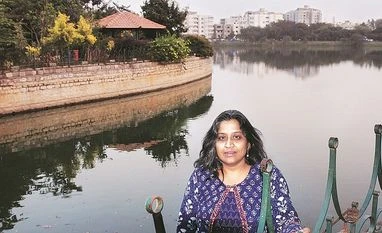Edited Excerpts:
The Kaikondrahalli lake has seen a remarkable revival. What can be done to replicate this success to other lakes in the city, especially the Bellandur lake?
Kaikondrahalli’s restoration has taken perseverance, planning, foresight and strong ethics on the part of the core team. We are currently putting similar amount of effort into other lakes in our region. As for the Bellandur lake, the problems are on a much larger scale and the solutions, too, need more intense work. But, to me, it seems like many people are interested in a blame-game and not in collective solution-seeking. When we realised that this project was not conducive to our style of work, we chose not to advice or be involved. We feel that if whoever is leading the way is allowed to work on a well-reasoned set of solutions and if politicians can, regardless of their affiliations, pave the way for their implementation, it will work better than the current impasse on finding the “perfect” solution or fighting over who gets credit.
It appears to be a paradox that with the best research minds in the city, Bengaluru is struggling with grave environmental issues. What do you think is the reason for this?
We have some amazing residents who are working for the benefit of the city. Our elected representatives and bureaucrats have too much on their platter, yet they are reluctant to open the door and let people in to help do the work that they are unable to do for whatever reasons. Also, some non-government groups are not working in a spirit of camaraderie. We have enough problems in the city and each can have myriad solutions. If people just take up what they think is the best solution and work to implement it somewhere it hasn’t been, instead of reversing the fruits of an ongoing project, we can all get along and see some positive impact sooner than later.
What are the obstacles that people who work for the welfare of the city's lakes and environment face today?
I can’t generalise about the welfare of the city. But I can tell you what we have experienced from talking to various lake and solid-waste management groups. There are a few good politicians and bureaucrats who actively help (or don’t oppose) citizen groups in achieving what they themselves can’t or don’t have time to do. But political squabbling is a huge impediment. When you don’t have political god-mothers and -fathers, you are at the mercy of trolls who keep bringing up irrelevant issues in an effort to get you to bow in obeisance. It takes a lot of effort to be honest about our work and keep things transparent, while fighting off people whose only aim is to poke holes in whatever we do or ask us to give them undue credit.
From your experience and of those at the grassroots level, what can be immediately done to curtail the environmental chaos?
While I am no expert, we are now intimately involved with nearly 200 acres of lakes in Bellandur Ward, either formally or informally through our citizen participatory approach. We feel that if people focus on identifying an issue they care about and put in even an hour or two each week, they will see some impact. Request your officials to get the streetlight outside your house fixed and keep harassing them till they do it. Work to make a relationship with your pourkarmika so you know if they are being paid. That will make you more involved in the garbage crisis of your city. There are so many small things to do and so few people who want to put in an effort. Simply paying taxes hasn’t yielded results and it won’t. Instead of calling it chaos, let’s roll up our sleeves and tuck in our pallus to do something and make the system more accountable.
What do you think should be the immediate focus of the administration to curb and then reverse the damage done to the environment?
For relatively easier solutions to curb damage, officials should bring together citizens who will work to seek hyper-local solutions and help implement those. An officer like Bruhat Bengaluru Mahanagara Palike Chief Engineer B V Satish allowed us a seat at the table and look what our partnership with him and his team has resulted in — bio-diverse, socially impactful and community-centric lakes that would have otherwise had the same fate as other lakes in the city. This would not have been possible if Satish had seen us as adversaries and had not allowed us to actively participate in problem-solving and implementation. We need more visionary bureaucrats and elected representatives like him.
To read the full story, Subscribe Now at just Rs 249 a month
Already a subscriber? Log in
Subscribe To BS Premium
₹249
Renews automatically
₹1699₹1999
Opt for auto renewal and save Rs. 300 Renews automatically
₹1999
What you get on BS Premium?
-
Unlock 30+ premium stories daily hand-picked by our editors, across devices on browser and app.
-
Pick your favourite companies, get a daily email with all news updates on them.
Full access to our intuitive epaper - clip, save, share articles from any device; newspaper archives from 2006.
Preferential invites to Business Standard events.
Curated newsletters on markets, personal finance, policy & politics, start-ups, technology, and more.
Need More Information - write to us at assist@bsmail.in



)